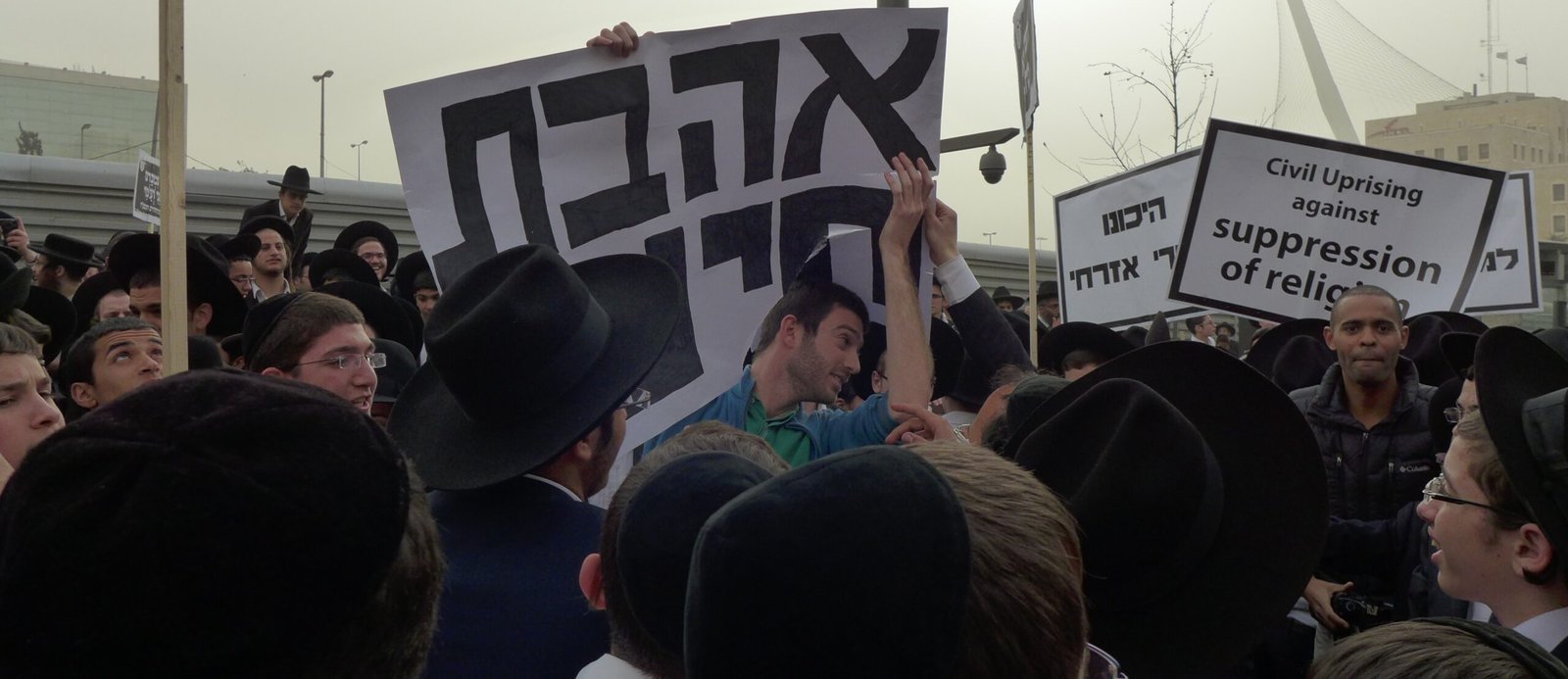Share This Story, Choose Your Platform!
The world is in turmoil. Hundreds of thousands of people are killed every year. Millions are on the run as refugees. Millennia-old cultures disappear. Political and social orders that seemed irrefutable are being shaken.
The modern Jewish state is a peaceful island in the middle of a bloody jungle. Even hostile neighbours openly admire Israel as an example of stability and economic success. In global comparison, the country is a model of tolerance and coexistence of different ethnic groups, cultures, religions and political convictions.
So why have almost all reputable politicians from the Americas to China, Finland to South Africa, have nothing better to do than to solve “the Middle East conflict”? I certainly don’t want to distract from those problems that actually exist in and in connection with Israel. The Jewish state does face challenges indeed. Not all is well in the land of Israel. But the ailments of Israel are hair loss, bad skin or, at worst a cold, compared to the pestilence and epidemics that slay millions in our immediate environment and around the world.
“Just why,” the author of Psalm 2 asks, “do the nations rage? Why do the states murmur in vain?” (verse 1). In very few words, he draws the picture of a chaotic, uncontrollably roaring, unmanageable mass of human beings. The global community of nations, through which the people of this planet sought to achieve peace, security and order, is in turmoil.
“The kings of the earth set themselves. The bureaucrats take counsel together” (verse 2a). The ruling politicians should actually be in control and have the reins in hand. But they swim with the stream of the majority opinion and agree to secret deliberations. Instead of opposing the zeitgeist and demanding reason, they write resolutions that ultimately lead to war because they bow to the dynamics of the raging mob. All of this is seen by Jewish interpreters of Scripture in these few Hebrew words.
Martin Luther describes the troubled nations in his interpretation as “unreasonable beasts” and notes that the word used here, which he translates as “Gentiles,” “is often used in opposition to Israel or the Jews”[1].
The Psalmist makes two observations in the first two verses that cannot be detected by ordinary human perception. They require a prophetic understanding, a perspective that is impossible for the average human eye.
First, the aspirations of the Gentile nations and their leaders are literally “empty,” that is, “meaningless,” “unreasonable,” “futile.” When it refers to the actions of personalities in authority who vigorously represent or even demand something, the little Hebrew word ‘rek’ (ריק), which stands at this point, means criminally “reckless.”
Second, the rebellion of the Gentiles is directed “against the Lord and against His Messiah” (verse 2b).
Biblical word studies show that “the Son,” “the Servant,” and “the Messiah” of God are first the people of Israel. So, God explains to the Egyptian pharaoh: “Israel is my firstborn son!”, and demands, “Let my son go that he may serve me!” Then He goes on to threaten: “If you refuse, however, I will kill your firstborn son!” (Exodus 4:22f.). Likewise, the prophet Isaiah depicts the people of Israel as the servant of the Lord and King David knows that God “rebuked kings for the sake of Israel,” declaring, “Do not touch my Messiahs”, i.e., “my anointed ones” (1 Chronicles 16:21f.).
Of all exegetes, Martin Luther feels at this point a connection with Zechariah 2:12: “He who touches you, touches the ball of my eye.”[2] However, ultimately caught up in the thinking of substitution theology, he overlooks the original meaning of Zechariah 2 regarding the Jewish people, which is also possible here in Psalm 2:2. Luther applies what is being said without further consideration to Christ and the Christian Church exclusively.
It does not have to be a contradiction, however, if the New Testament applies the words of the prophet, “I have called my son out of Egypt” (Hosea 11:1) to Jesus (Matthew 2:15). In no way, it is irreconcilable with Israel’s special status as chosen people of God if the New Testament sees in Jesus the servant of God from the prophetic book of Isaiah, who bears the weakness and sickness of his nation[3]. Naturally, the New Testament recognises in Jesus the Messiah, the Son of God and King of Israel. From a biblical perspective, only the unity of the people of Israel with her King gives the complete picture of “the Son of God”, “the Servant of the Lord” or “God’s Anointed One”. The people of Israel are not complete without their King. And Jesus Christ will necessarily turn into an empty theological phrase if He is detached from his Jewish people and background.
The masses of the Gentile nations may tear each other apart and cause endless suffering to themselves. In their target direction, so the prophetic psalmist recognises, they agree “against the Lord and against his Messiah”.
“Let us burst their bonds. Let us cast away their cords.” Verse 3 summarises the outcry for the emancipation of the Gentile world. The Hebrew words draw the violent tearing[4] of straps binding a yoke to a draft animal (Rashi)[5]. The orthodox German Rabbi Samson Raphael Hirsch[6] and the German reformer Martin Luther are in agreement that these “bonds and cords” are exactly those divine orders without which a nation will perish. The word of God wants to serve the nations of this world for salvation. But instead of seeking to heal on the only path leading to that goal, laments Rabbi Hirsch, those who are in dear need of salvation fight the saving principle. They “look for the disease exactly where the cure is, and look for healing in what only multiplies their infirmity.”[7]
Footnotes:
[1] Johann Georg Walch (hg.), Dr. Martin Luthers Sämtliche Schriften. Vierter Band. Auslegung des Alten Testaments (Fortsetzung). Auslegung über die Psalmen (Groß Oesingen: Verlag der Lutherischen Buchhandlung Heinrich Harms, 2. Auflage, 1880-1910), 254.
[2] Johann Georg Walch (hg.), Dr. Martin Luthers Sämtliche Schriften. Vierter Band. Auslegung des Alten Testaments (Fortsetzung). Auslegung über die Psalmen (Groß Oesingen: Verlag der Lutherischen Buchhandlung Heinrich Harms, 2. Auflage, 1880-1910), 258.
[3] See, for example, Matthew 8:17 referring to Isaiah 53:4.
[4] Samson Raphael Hirsch, Psalmen (Basel: Verlag Morascha, 2. Neubearbeitete Auflage 2005), 8.
[5] Rabbi Shlomo Ben Yitzchak (1040-1105) or “Rabbi Shlomo Itzchaki,” commonly called “Rashi,” was born in the northern French town of Troyes, studied for ten years in Mainz and Worms, before he returned to Troyes, where he distinguished himself as a judge and teacher. In his last years he witnessed the persecution of Jews during the Crusades. Rashi is one of the extraordinary interpreters of Jewish writings and the very first who explained the Bible and the Talmud comprehensively. His basic concerns were to bring Holy Scripture to the people, to promote the unity of the Jewish people and the theological confrontation with Christianity. Raschi made a sharp distinction between “pshat” (literal interpretation) and “drash” (allegorical interpretation), whereby the pshat gives the rash. His interpretation of Scripture has decisively shaped the reformer Martin Luther.
[6] Samson Raphael Hirsch (1808-1888) came from Hamburg and served as Chief Rabbi in Oldenburg, Aurich, Osnabrück, Moravia and Austrian Silesia. As a distinguished representative of Orthodoxy, he was an outspoken opponent of reformist and conservative Judaism. Hirsch attached great importance to the study of all Scripture. From 1851 he was rabbi of the separatist Orthodox „Israelitischen Religions-Gesellschaft“ (“Israelite Religious Society”), engaged in education and published the monthly magazine “Jeschurun”. Hirsch had a great love for the land of Israel, was at the same time, however, an opponent of the proto-Zionist activities of Zvi Hirsch Kalischer. He is seen as one of the founding fathers of the neo-orthodox movement.
[7] Samson Raphael Hirsch, Psalmen (Basel: Verlag Morascha, 2. Neubearbeitete Auflage 2005), 8.






















